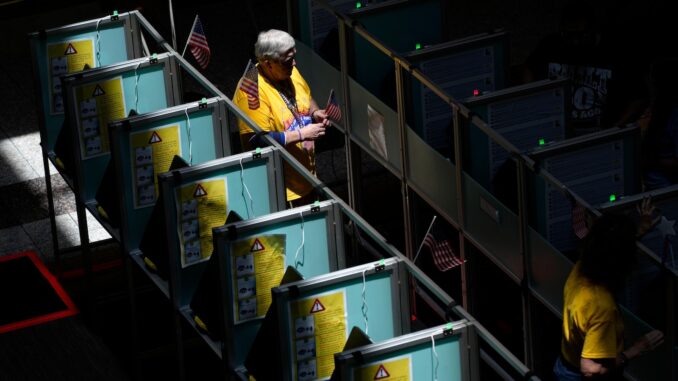
WASHINGTON — Nevada is once again home to competitive races that could determine control of the White House and the U.S. Senate. It is also one of 10 states where voters will decide a high-profile ballot measure on abortion in the wake of the U.S. Supreme Court’s 2022 decision overturning Roe v. Wade.
Nevada has six electoral votes, making it the smallest prize of the seven presidential battleground states that Democratic Vice President Kamala Harris and Republican former President Donald Trump and their campaigns view as critical to winning the presidency. Both candidates have made multiple campaign stops in Nevada since becoming their parties’ nominees over the summer.
In a race for a seat in the closely divided U.S. Senate, Democratic incumbent Jacky Rosenseeks a second term against Republican Sam Brown, a retired Army captain who ran unsuccessfully for the GOP nomination for the state’s other U.S. Senate seat in 2022.
Voters will also decide ballot measures that would enshrine abortion rights in the state constitution, require voters to show photo identification in order to vote and adopt a nonpartisan, ranked-choice voting system in future elections.
Nevada has one of the nation’s best track records as a presidential bellwether. The candidate who won the state has gone on to win the White House in 27 of the last 30 presidential elections. It voted for the losing candidate only in 1908, 1976 and 2016, when Democrat Hillary Clinton carried the state. Democrats have won Nevada in the last four presidential elections.
Nov. 5.
10 p.m. ET.
6 awarded to statewide winner.
President: Harris (D) vs. Trump (R) vs. Chase Oliver (Libertarian) vs. Joel Skousen (Independent American Party) vs. “None of these candidates.”
U.S. Senate: Rosen (D) vs. Brown (R) and two others plus “None of these candidates.”
Ballot measures: Question 6 (Right to abortion), Question 3 (Top-five primary, ranked choice general election), Question 7 (Require photo ID to vote).
U.S. House, state Senate, state Assembly, state Supreme Court and Washoe county commissioner.
Nevada conducts its elections predominantly by mail. In 2021, the state adopted a law requiring mail-in ballots to be automatically sent to active voters, making permanent an emergency measure implemented during the COVID-19 pandemic. In the midterm elections the following year, about 80% of voters cast their ballots in-person before Election Day or by mail.
Mail ballots that are postmarked by Election Day will be counted if they are received by Nov. 9, four days after Election Day. With a large number of mail ballots potentially arriving after Election Day, the outcome of some highly competitive races might not be determined until these additional mail ballots are received and tabulated. State Republicans challenged this law, but a federal court dismissed the lawsuit in July. In recent elections, votes counted after Election Day have been heavily Democratic.
Although most ballots are cast by mail, voters have the option of voting in-person at a polling place on Election Day. The state does not release any vote results until the final voter in line has cast a ballot, which could be well after the time polls formally close.
In statewide elections, Democrats tend to carry only two of Nevada’s 17 counties: Clark (home to Las Vegas) and Washoe (home to Reno). Whether they win depends on how big their margins are in those two counties. Clark County has by far the largest population in the state and is vital to Democratic electoral success. It comprised 69% of the total statewide vote in 2020.
In the 2022 midterm elections, the Republican candidates for U.S. Senate and governor both took an early lead when the first votes were reported after polls closed, but the two races tightened considerably and ultimately saw different outcomes as more mail ballots were tallied. Democratic U.S. Sen. Catherine Cortez Masto eventually overtook Republican Adam Laxalt for the lead four days after Election Day and ultimately prevailed when the results were certified. In the gubernatorial race, Republican Joe Lombardo kept his slim lead and defeated Democratic incumbent Steve Sisolak.
The Associated Press doesn’t make projections and will declare a winner only when it has determined there is no scenario that would allow the trailing candidates to close the gap. If a race hasn’t been called, the AP will continue to cover any newsworthy developments, like candidate concessions or declarations of victory. In doing so, the AP will make clear it hasn’t declared a winner and explain why.
Nevada does not have an automatic recount law, but candidates may request and pay for a recount within three days of the county or statewide canvass, regardless of the vote margin. The AP may declare a winner in a race that is subject to a recount if it can determine the lead is too large for a recount or legal challenge to change the outcome.
2020: Biden (D) 50%, Trump (R) 48%, AP race call: Saturday, Nov. 7, 2020, 12:13 p.m. ET.
Registered voters: 2,379,571 (as of Sept. 1, 2024). About 30% Democrats, 28% Republicans.
Voter turnout in 2020 presidential election: 68% of registered voters.
Votes cast before Election Day 2020: about 89% of the total vote.
Votes cast before Election Day 2022: about 80% of the total vote.
Votes cast before Election Day 2024: See AP Advance Vote tracker.
First votes reported, Nov. 2020: 11:41 p.m. ET.
By 6 a.m. ET on Nov. 4: about 79% of total votes cast were reported.
___
Associated Press writer Maya Sweedler contributed to this report.
___
Read more about how U.S. elections work at Explaining Election 2024, a series from The Associated Press aimed at helping make sense of the American democracy. The AP receives support from several private foundations to enhance its explanatory coverage of elections and democracy. See more about AP’s democracy initiative here. The AP is solely responsible for all content.


Be the first to comment